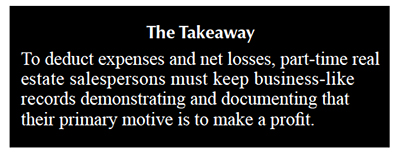
Profit Motive: Key for Part-Timers

 Information about selling real estate on a part-time basis is abundant on the web. Part-timers can find out about specific part-time real estate positions and get advice about selling real estate on a part-time basis, among other topics. The article “Can Part-time Real Estate Agents Succeed at Selling Houses?” by InvestFourMore, is an example.
Information about selling real estate on a part-time basis is abundant on the web. Part-timers can find out about specific part-time real estate positions and get advice about selling real estate on a part-time basis, among other topics. The article “Can Part-time Real Estate Agents Succeed at Selling Houses?” by InvestFourMore, is an example.
In general, all is well as far as the IRS is concerned if the part-timer generates a taxable net profit and has reasonable documented expenses. However, net losses incurred by part-time real estate salespersons draw IRS scrutiny and may be disallowed if the part-timer cannot demonstrate and document a “profit motive.” The primary motive of the salesperson must be to earn a profit. If so, the activity is treated by the IRS and courts as a trade or business (for which losses are allowed) rather than a hobby (for which losses are restricted or denied).
The determination of whether the primary motive is for profit is based on the “facts and circumstances” of each particular situation. There is no mechanical test for demonstrating a primary profit motive, but a number of factors are typically considered by the IRS and the courts. While no single factor is determinative, documentation is key. According to Treasury regulations (which have the force and effect of law), the most commonly used factors relevant for real estate part-timers are:
- manner in which activity is conducted (for example, salespersons should keep records in a business-like manner, using a recordkeeping system such as QuickBooks);
- expertise of the salesperson;
- time and effort spent on the activity;
- salesperson’s success in similar or dissimilar real estate activities;
- salesperson’s history of income or losses with respect to the activity; and
- salesperson’s finances.
A recent court case illustrates how the factors are applied. In this case, over $30,000 of deductions related to part-time real estate sales activities were disallowed. From 2007 through 2009, Mr. Pouemi earned a living as a full-time technician for Verizon. Sometime during 2009, he lost his job. In court, he stated that he “did real estate on the side.” He was a licensed real estate broker.
Mr. Pouemi did not maintain a formal set of accounting records and did not have a bank account dedicated to his real estate activities. He did not obtain any listings or make any sales during 2008 and 2009. In 2007, he listed and sold one property from which he netted $9,457. The house was one block from Mr. Pouemi’s personal residence.
Numerous expenses included car and truck expenses, parking and tolls, tools, office expenses, and “personal marketing.” In addition, 26 other types of expenses were claimed. All were disallowed by the IRS. The tax court upheld the IRS position.
Mr. Pouemi lost the case for several reasons. In general, there was no “convincing substantiation” for any of his expenses. He did not maintain a contemporaneous log of automobile expenses even though he claimed over 28,000 (yes, over 28,000) business travel miles. The court found the business mileage to be “completely implausible.” Mr. Pouemi created a table during the IRS audit, but many of the entries were vague. Moreover, he had no documentation of the percentage of his cell phone, text messaging, or email expenses that was related to business.
He offered no plausible explanation of how his real estate activity required the expenditure of $3,552 for “tools.” He did not have a staff, and he offered no plausible explanation of his claimed deductions for expenses of “staff meetings” and “payroll processing.” Nor did he explain what the claimed expense of $850 for “personal marketing” entailed. Although he testified that he took continuing education classes, he demonstrated no serious effort to advance his career as a real estate professional. His testimony that he devoted 30 hours per week to his real estate activity was “not credible.”
Mr. Pouemi’s fact pattern is admittedly extreme. A tax accountant or tax attorney knowledgeable about real estate transactions might have suggested that he conduct his real estate activities in a more business-like manner, including adequate recordkeeping, reasonable, realistic deductions, and IRS-approved documentation.
____________________
Dr. Stern ([email protected]) is a research fellow with the Real Estate Center at Texas A&M University and a professor of accounting in the Kelley School of Business at Indiana University.
You might also like

Publications
Receive our economic and housing reports and newsletters for free.






